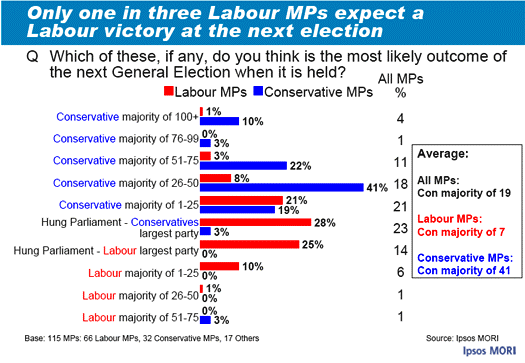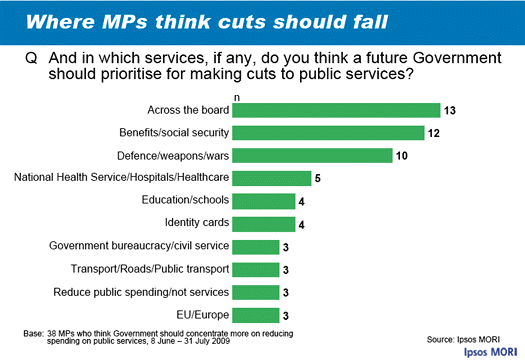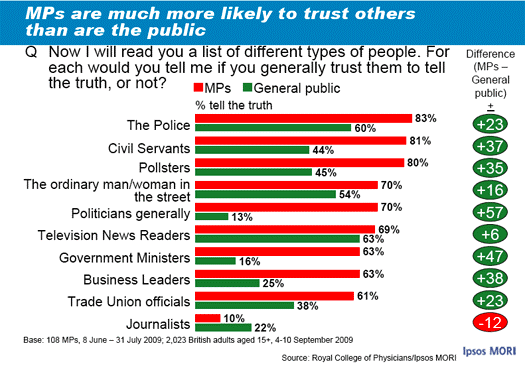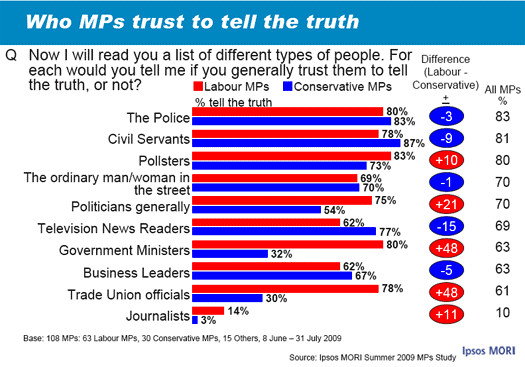Labour MPs twice as likely to expect a Conservative victory than a Labour victory
Labour MPs are twice as likely to expect a Conservative victory than a Labour one
Only one in three Labour MPs (36%) now believe that their party will be the largest party after the next election, compared to three in five (61%) who expect the Conservatives to be the largest party. Conservative MPs are much more optimistic about their party’s prospects: almost all (95%) expect a Conservative majority. The most common prediction is a majority of 26-50, with two in five (41%) Conservative MPs who anticipate this outcome. On average Conservative MPs expect a Conservative majority of 41. Labour MPs on average expect a Conservative majority of 7.

Labour and Conservative MPs disagree on how to ‘balance the books’
With public debt and borrowing at record levels, many Labour MPs support tax rises to balance the books and most Conservative MPs back spending cuts.
Overall, MPs are more likely to support reducing spending on public services than support tax rises to reduce public debts: 37% support spending cuts and only 28% increased taxes. This however disguises a large split in the House, with 77% of Conservative MPs who believe that spending on public services should be reduced in order to reduce public debts, compared to just 13% of Labour MPs who feel the same way. Labour MPs are instead more likely to support tax rises (42% support this, while no Conservative MP we spoke to supports this).

MPs then, are as split as the general public on this issue – and neither party is in touch with the full range of public opinion. Ipsos’s latest research for the RSA shows that the public is still unwilling to accept hard truths about the state of public finances – while there is strong support of efficiency savings, the public is split on the issue of tax rises or cuts to services that directly affect them:
-
Ipsos/RSA Poll: Voters not ready for spending cuts
Among those MPs who want cuts in spending on services, they most commonly cite ‘across the board cuts’, cuts to benefits spending and defence cuts.

MPs much more likely than the public at large to trust other people – except journalists
Despite sometimes being seen as cynical, MPs are more likely than the general public to trust ordinary people as well as to trust professions except journalists.
While seven in ten MPs (70%) say they trust politicians to tell the truth and 63% trust Government Ministers, among the general public only 13% trust politicians to tell the truth and 16% trust Ministers.
Journalists are the only group where fewer MPs than the public trust them to tell the truth (just 10% of MPs trust journalists, compared to 22% of the public). More MPs (70%) say that the ordinary person in there street can generally be trusted to tell the truth than the public at large (54%).

MPs’ greater propensity than the public to trust others also applies to a range of other professions, such as the Police (of whom 83% of MPs trust compared to 60% of the public who trust them), Civil Servants (81% vs. 44%) and Business Leaders (63% vs. 25%).

-
Download the MPs Survey slide pack (PDF; 305K)
-
Download the Press Release (PDF; 76K)
Technical detail
Ipsos interviewed 122 MPs (Labour 69, Conservative 36 and Others 17) face-to-face between 8 June and 31 July 2009. An initial sample of 327 MPs was contacted to ensure that those interviewed closely represent the profile of the House of Commons.
The questionnaire was ‘versioned’ to keep the interview to a reasonable length (i.e. not all MPs are asked each question, which is why the base size at each question varies).
The total sample interviewed is closely representative of the House. Based on those asked each question, data have been individually weighted where necessary to reflect the true balance by party and ministerial or spokesperson position.
For further information:
Ben Page Chief Executive Email Graham Keilloh Deputy Head of Political Research Email



